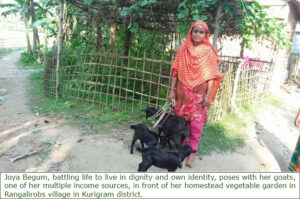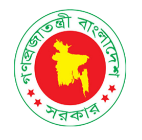Rangalirbos is a beautiful village in Royganj union, Nageshwari Upazila, Kurigram with the majestic but rapid Dudh Kumar river running through it. This makes it one of the many disaster prone villages in Bangladesh where threats such as flood and soil erosion hampers the overall livelihood of the people. Additionally, lack of education and poor access to income generating activities further adds to the challenge. Joya Begum (35) is one of the landless, poor and vulnerable women who lives with her husband Md. Tunu Mia (37) and two children in the village. The family was running quite smoothly for them when it was just the two of them. But ever since they welcomed their daughter and son in the world, the expenses had been increasing day by day. Gradually being a day laborer, Tunu Mia’s income for the family of four to survive, was no longer enough to survive. They had to resort to eating one to two meals per day to tackle the situation. During lean periods, Joya had to work alongside her husband and also offer door to door maid services in order to make ends meet. But despite Joya’s best effort, her hard work was not enough for a sustainable livelihood and most importantly securing education expenses for her children. In 2016, Joya was enlisted as one of the participants of CARE Bangladesh’s Strengthening Household Ability to Respond to Development Opportunities (SOHUHARDO) III upon being recommended by the local Village Development Committee (VDC) of the program. She received a 5 day long training on integrated Comprehensive Homestead Development (CHD) where she learnt about using homestead to grow vegetable, rear goats and poultry. Additionally, she received BDT 3000 as input support which she invested on buying a goat, 4-5 poultry and some saplings. She started cultivating vegetable in 5 decimals lease land. To her delight, her goat gave birth to 3 kids within a week of purchase and soon after that her chicken started laying eggs too.
Slowly life has changed for Joya. Now a days, she and her family can pick their daily vegetable straight from her rich vegetable garden, eggs from hen and her other incomes are ensuring that they can have three meals a day. Sometimes, she sells eggs at market and the extra money helps her with her children’s education support. She has already sold two goats and saved BDT 3000 (US$ 36.57) for emergency. Engaging in these income generation activities has helped her enroll her children into school and achieve food, nutrition and income security.
Improved income security has also increased her social acceptance. Men and women in her community often come to her for advice. She is also often invited to attend meetings with the local women solidarity group ‘Empowerment, Knowledge and Transformative Action (EKATA)’ to share her success story among the group members. Taking inspiration from Joya’s success, many of the local poor and extreme poor (PEP) women have also started cultivating vegetables and rearing poultry and goat in their homestead area. She also reaches out to government officials like Sub Assistant Agriculture Office (SAAO), who then visits her house from time to time to provide advices on production to her and the other community people. Joya believes that if all poor and extremely poor people can receive technical knowledge about income generating activities like herself, Bangladesh will no longer have poverty and they will all join her as she sings “We shall overcome, we shall overcome, we shall overcome someday.”
In 2016, Joya was enlisted as one of the participants of CARE Bangladesh’s Strengthening Household Ability to Respond to Development Opportunities (SOHUHARDO) III upon being recommended by the local Village Development Committee (VDC) of the program. She received a 5 day long training on integrated Comprehensive Homestead Development (CHD) where she learnt about using homestead to grow vegetable, rear goats and poultry. Additionally, she received BDT 3000 as input support which she invested on buying a goat, 4-5 poultry and some saplings. She started cultivating vegetable in 5 decimals lease land. To her delight, her goat gave birth to 3 kids within a week of purchase and soon after that her chicken started laying eggs too.
Slowly life has changed for Joya. Now a days, she and her family can pick their daily vegetable straight from her rich vegetable garden, eggs from hen and her other incomes are ensuring that they can have three meals a day. Sometimes, she sells eggs at market and the extra money helps her with her children’s education support. She has already sold two goats and saved BDT 3000 (US$ 36.57) for emergency. Engaging in these income generation activities has helped her enroll her children into school and achieve food, nutrition and income security.
Improved income security has also increased her social acceptance. Men and women in her community often come to her for advice. She is also often invited to attend meetings with the local women solidarity group ‘Empowerment, Knowledge and Transformative Action (EKATA)’ to share her success story among the group members. Taking inspiration from Joya’s success, many of the local poor and extreme poor (PEP) women have also started cultivating vegetables and rearing poultry and goat in their homestead area. She also reaches out to government officials like Sub Assistant Agriculture Office (SAAO), who then visits her house from time to time to provide advices on production to her and the other community people. Joya believes that if all poor and extremely poor people can receive technical knowledge about income generating activities like herself, Bangladesh will no longer have poverty and they will all join her as she sings “We shall overcome, we shall overcome, we shall overcome someday.”
July 8, 2019


